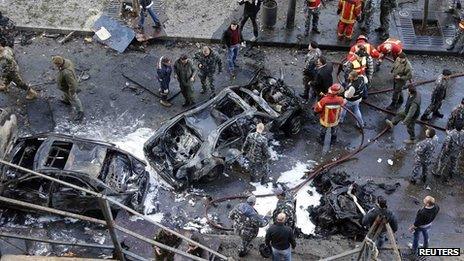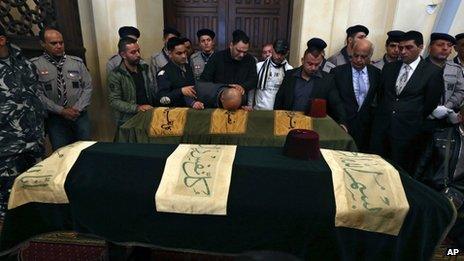Saudi Arabia 'to give Lebanon army $3bn grant'
- Published
Crowds of mourners have been gathering at a mosque in Beirut
Saudi Arabia is to give Lebanon's army a grant of $3bn (£1.8bn, 2.8bn euros).
Lebanese President Michel Suleiman made the announcement in a televised address after the funeral of a senior Lebanese politician killed in a car bomb attack. He said it would help fight terrorism.
Mohamad Chatah, a Sunni Muslim, was a staunch critic of Syrian President Bashar al-Assad and Lebanon's Shia Hezbollah movement that backs him.
Saudi Arabia and Hezbollah have taken opposite sides in the Syrian conflict.
Coming to the boil
"The king of the brotherly Kingdom of Saudi Arabia is offering this generous and appreciated aid of $3bn to the Lebanese army to strengthen its capabilities," Mr Suleiman said in his address.
He said it was the largest assistance provided in Lebanon's history and would be used to buy weapons from France.
French President Francois Hollande said his country would "meet" any demands for weapons from Lebanon during a visit on Sunday to Saudi Arabia aimed at boosting commercial ties with the kingdom.
"I am in touch with President Suleiman... If demands are made to us, we will meet them," he said.
Mr Suleiman said the Saudi aid would finally allow the Lebanese army to "confront terrorism" and put an end to the proliferation of arms.
The BBC's Arab Affairs Editor Sebastian Usher said the president indirectly touched on a dangerous taboo in Lebanon - the unchecked power of the Shia movement, Hezbollah.
That issue is coming to the boil due to the conflict in neighbouring Syria where Hezbollah is fighting on the side of President Assad, our correspondent says.
Heinous crime
The Saudis back the other side - the mostly Sunni rebels. The kingdom also supports the pro-western March 14 alliance in Lebanon, of which Mohamad Chatah was a leading member.
Lebanon has been hit by a wave of attacks linked to heightened Sunni-Shia tensions over the Syrian war.
Mr Chatah was buried on Sunday amid tight security.
The former Lebanese minister and opposition figure was killed by a car bomb on Friday, which also killed six other people and injured at least 50.

Mohamad Chatah was on his way to a meeting when the car bomb exploded

Mr Chatah was buried by a mosque by Beirut's Martyrs' Square
No-one has claimed responsibility for the bombing, but the leader of the March 14 alliance, former prime minister Saad Hariri, implicitly accused Hezbollah of carrying it out.
Hezbollah rejected the accusation, calling the bombing a "heinous crime, which comes in the context of a series of crimes and explosions aimed at sabotaging the country".
Syria also denied any involvement in the attack.
- Published29 December 2013
- Published29 December 2013
- Published27 December 2013
- Published27 December 2013